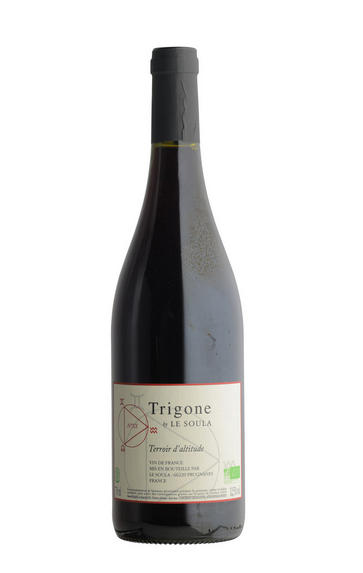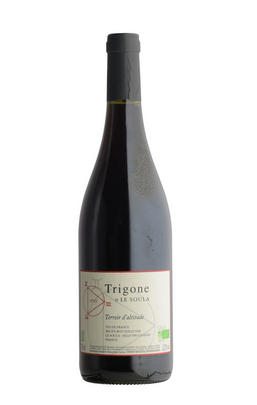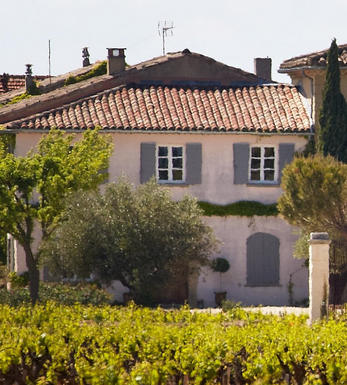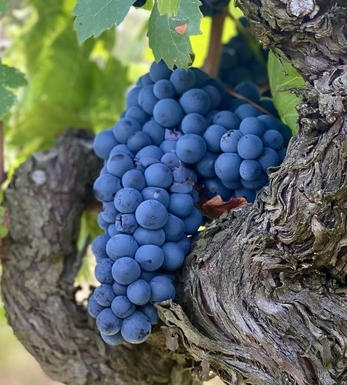
Le Soula, Trigone Rouge, Lot XX, Vin de France

Critics reviews
Fresh and floral scents with a touch of perfumed oak. Quite rounded and has a slightly warm finish.
Drink 2022 - 2030
Rosemary George MW, Andy Howard MW, Frederic Marti, Decanter.com (December 2021)
About this WINE

Le Soula
Le Soula produces wines of remarkable quality at high altitude in the Fenouillèdes region of the Roussillon, in the foothills of the Pyrénées, up above the Agly valley.
Le Soula’s wines combine freshness and vitality, a characteristic which stems from the soil and the climate. The soil is granitic and poor. The climate is hard and extreme, combining the heat of the Southern sun with the cold and rain of the mountains at a height of between 350 and 600 metres, and the effects of the Tramontane wind.
There are 53 hectares of which 23 are planted with vines in small widely spread parcels with different expositions to the sun.
Gérard Gauby, the Roussillon's most highly respected vigneron, had become aware of the potential of vineyards at higher altitude to produce wines with real finesse. In 2001 he formed a partnership with his English wine importers, Roy Richards and Mark Walford, to create a new estate. In 2008, they were joined by Gérald Standley who now runs the vineyard and has become a partner in the enterprise.
Since the outset, the vineyards have been managed organically and they are now worked biodynamically. Being completely organic the vineyards are a haven for flora and fauna. Wild boar emerge from the forests to turn over the soils in search of grubs and herbs, which are to be found in abundance.
The vineyard is principally composed of very old vines with some planted more recently. The red grape varieties are Carignan, Syrah and Grenache noir . The white wines are blended from a cocktail of Macabeu, Sauvignon blanc, Grenache blanc and gris, Vermentino, Marsanne, Roussanne, Malvoisie du Roussillon and Chardonnay. Le Soula is to be found in a great many of the world's leading restaurants in many different countries

Vin de France
Vin de France is a wine classification in France that was introduced in 2010 to replace the former Vin de Table category. It represents a more flexible and modern approach to French wine production, offering winemakers greater freedom in terms of grape sourcing, blending, and winemaking techniques.
Unlike wines with controlled appellations such as AOC Alsace or Vin de Pays, which are tied to specific regions within France, Vin de France wines can be sourced from grapes grown anywhere in the country. This gives winemakers the freedom to experiment with grapes from different regions, allowing for greater creativity and innovation.
Winemakers can blend grape varieties from different regions or even different countries to create unique flavour profiles. This flexibility enables the production of a wide range of wine styles, from traditional varietal wines to innovative blends.
While Vin de France wines offer greater flexibility in production, they still must adhere to certain labelling requirements. The label must include the designation "Vin de France," along with the producer's name and the volume of alcohol. Additional information such as grape variety, vintage, and specific geographical origin may also be included on the label.
Vin de France wines may not have the prestige or strict regulations of wines from controlled appellations. However, they can still offer excellent quality and value. Many producers use Vin de France as a platform for experimentation and innovation, resulting in a diverse range of wines that cater to various tastes and preferences.
Vin de France wines are often positioned as versatile, everyday wines that are accessible and easy to understand. They can offer a good balance between quality and affordability, making them popular choices for everyday consumption.

Carignan
Carignan, as its name suggests, is presumably of Spanish in origin, from around the town of Carineña west of Priorat in the province of Aragon.
Carignan, also known as Carginano in Italy and Cariñena or Mazeulo in Spain, is one of the most widely-planted red grapes in France. Planting became widespread in France during the 1960s, when Algeria gained its independence and was no longer an inexpensive source of red grapes. Languedoc-Rousillon (Cotes du Roussillon, Corbières, Saint Chinian) is the bastion of Carignan in France, and it is also grown Provence, although it now gradually being replaced with more complex and characterful varieties such as Syrah and Grenache.
The berries are blue-black, with fairly thick, astringent skins.Carignan buds and ripens quite late, so it is resistant to spring frosts, but requires a long ripening season and warm climate. It is a vigorous grape, which can result a wine of dull character.
Carignan is useful for adding intense colour, acidity, and fleshy tannins to the archetypal Southern French blends of Syrah, Grenache and Cinsault. Few select growers have managed to produce interesting, distinctive wines from this grape by carefully limiting the vine vigour and the yields.
Old Carignan vines (over 50 years) on a combination of low yields and suitable terroir can produce magnificently concentrated and characterful wine. The best expressions can be found in Priorat.


Buying options
Add to wishlist
Description
Trigone Rouge serves as the definitive representation of Le Soula, a straightforward and highly approachable red wine distinguished by its multi-vintage blend. For Lot XX, the blend consists of Carignan (55%), Syrah (43%), and Grenache Noir (2%), sourced from 2019 (64%), 2020 (33%) and 2018 (3%). The grapes are cultivated organically and biodynamically, and hand-harvested. Given its multi-vintage nature, the wine achieves superb balance, showcasing a floral aroma complemented by hints of red fruits and spices. The palate offers intensity balanced by refreshing vibrancy, with lingering notes of raspberries and blackcurrants.
Drink now
Berry Bros. & Rudd
wine at a glance
Delivery and quality guarantee